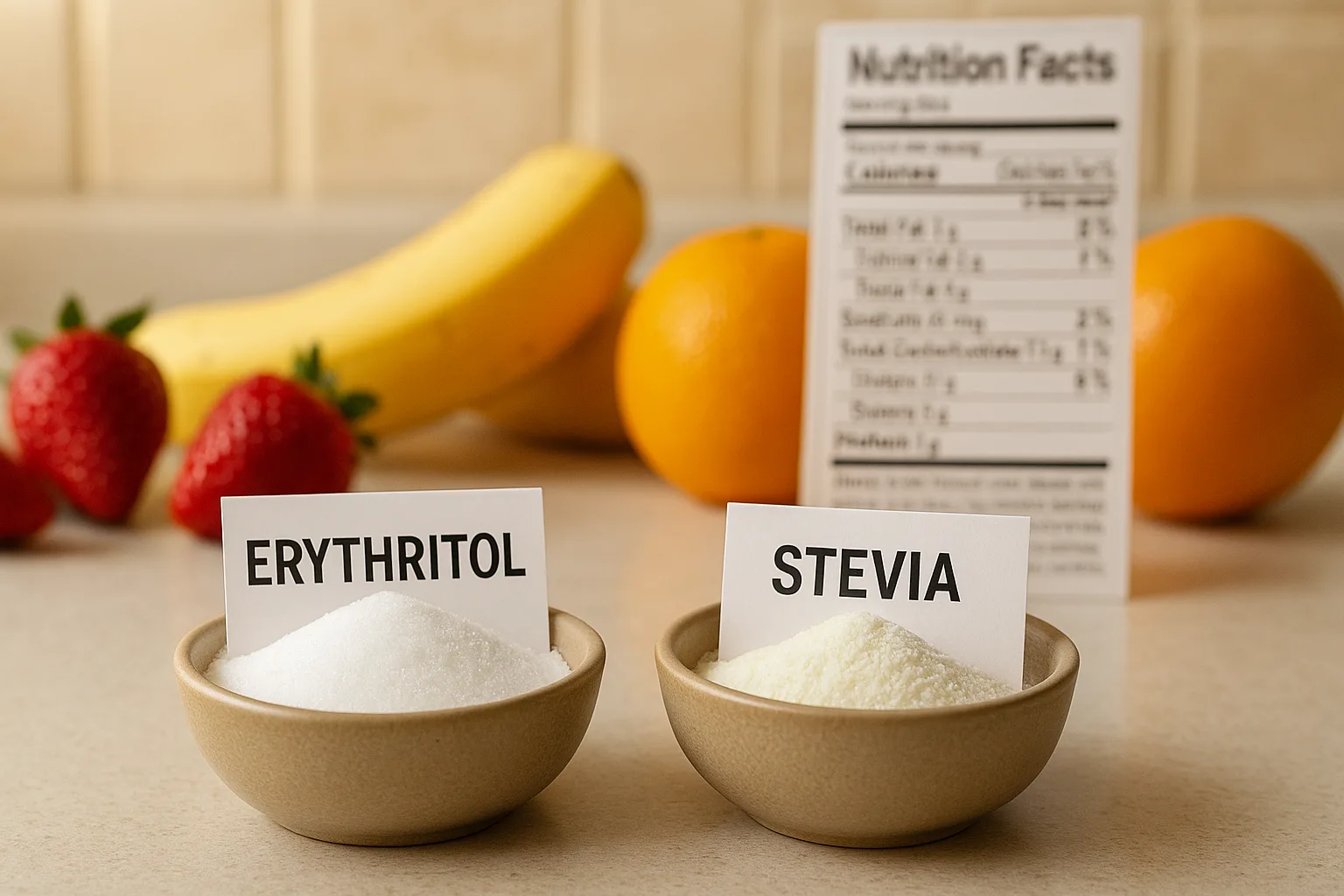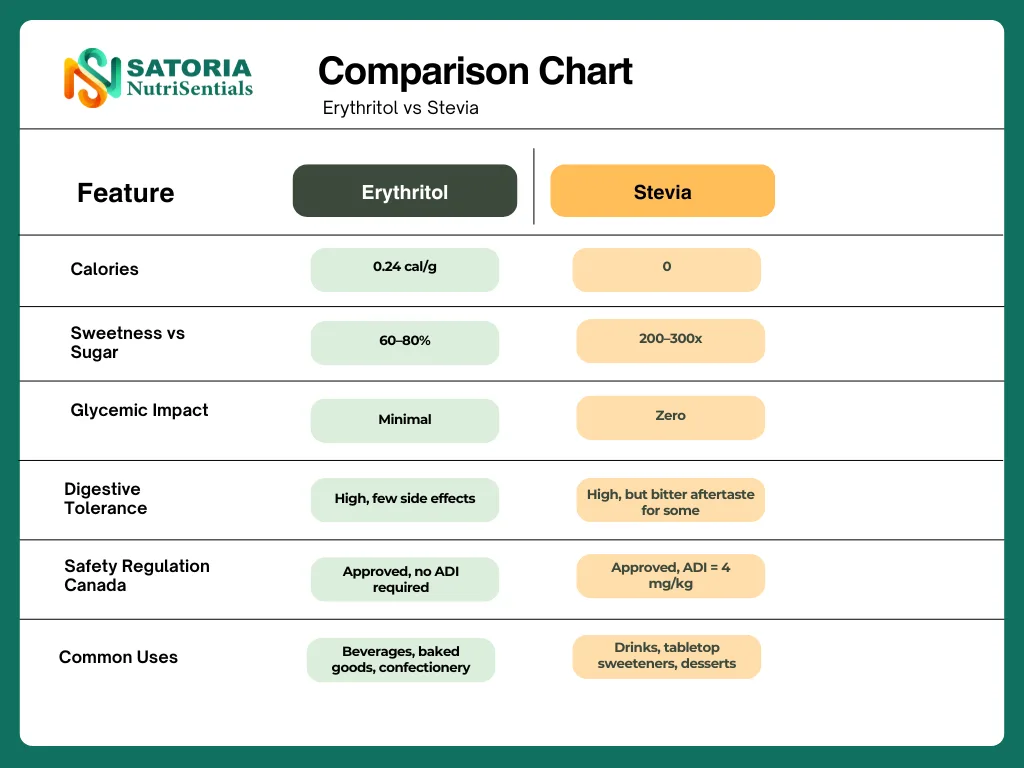Erythritol vs Stevia: Canadian Health Expert Comparison
September 7, 2025

Introduction
For Canadians aiming to reduce sugar intake, two names consistently come up: erythritol and stevia. Both are known for being low- or zero-calorie sweeteners, offering potential benefits for weight management, blood sugar control, and overall health.
But which is better? Canadian health experts and Health Canada sweetener guidelines provide valuable insights to help consumers, food manufacturers, and nutrition professionals understand the differences. In this article, we’ll explore safety regulations, expert opinions, potential side effects, and real-world applications for these popular sugar alternatives.
What Are Erythritol and Stevia?
Erythritol: A Naturally Occurring Sugar Alcohol
Erythritol belongs to a category called sugar alcohols (or polyols) that occur naturally in certain fruits, mushrooms, and fermented foods. Industrially, it’s often produced through fermentation using glucose derived from corn or wheat starch.
What makes erythritol popular is its near-zero calorie content—only 0.24 calories per gram—while providing about 60–80% of the sweetness of sugar. Because of this, it behaves much like sugar in recipes but with far fewer calories, making it attractive for low-calorie and low-carb diets like keto.
Key Benefits of Erythritol:
- Minimal impact on blood sugar and insulin response
- Good digestive tolerance compared to other sugar alcohols
- Does not cause tooth decay, unlike regular sugar
- Classified as safe under Health Canada sweetener guidelines
Stevia: A Plant-Based Zero-Calorie Sweetener
Stevia, on the other hand, comes from the leaves of the Stevia rebaudiana plant native to South America. Its active compounds, steviol glycosides, are up to 200–300 times sweeter than sugar yet contain no calories at all.
As a natural, plant-based sweetener, stevia is widely accepted among health-conscious consumers and is often used in products ranging from soft drinks to yogurts.
Key Benefits of Stevia:
- 100% natural origin
- No calories or carbohydrates
- Suitable for diabetics and low-glycemic diets
- Approved under erythritol stevia regulation Canada standards
Health Canada Regulations and Safety Insights
Canada maintains strict sugar substitute regulations to protect public health. Before approval, each sweetener undergoes scientific review for potential toxicity, metabolic effects, and long-term safety.
Health Canada Sweetener Guidelines note:
- Erythritol: No Acceptable Daily Intake (ADI) needed due to extremely low toxicity and minimal absorption in the body.
- Stevia: ADI set at 4 mg per kg body weight daily, expressed as steviol equivalents.
This means a 70 kg adult could safely consume up to 280 mg of stevia glycosides each day without health concerns. Both sweeteners, when used within recommended limits, remain safe for general populations, including people with diabetes and metabolic syndrome.
Erythritol vs Stevia: Health Comparison
Compare key features of erythritol and stevia to see which suits your health and product needs.


Expert Opinions on Health and Safety
Canadian dietitians and public health experts point out several findings:
- Erythritol is absorbed but largely excreted unchanged, causing minimal digestive discomfort compared to other sugar alcohols like sorbitol or maltitol.
- Stevia offers intense sweetness without calories but may leave a mild bitter or licorice-like aftertaste, depending on formulation and concentration.
- Both sweeteners help reduce overall added sugar consumption, a key recommendation in Canada’s Food Guide for preventing obesity and Type 2 diabetes.
Some studies have examined erythritol cardiovascular risk Canada, but Health Canada continues to classify erythritol as safe when consumed responsibly.
Side Effects and Tolerability
While both erythritol and stevia are considered safe, some individuals may experience mild side effects:
- Erythritol: Large doses (over 50 g/day) can occasionally cause digestive discomfort like bloating, but this is far less frequent compared to other sugar alcohols.
- Stevia: High concentrations can lead to a lingering aftertaste, though improved formulations have reduced this issue significantly.
Overall, neither sweetener shows any major long-term health risks when used within Health Canada’s recommended guidelines.
Applications in Food and Beverages
Both sweeteners have carved out unique spaces in the Canadian food and beverage industry:
- Erythritol works best for baked goods, chocolates, and products where sugar’s bulk and texture are essential. Its stability at high temperatures makes it ideal for sugar-free confectionery and keto-friendly products.
- Stevia dominates in beverages, table-top sweeteners, and low-calorie dairy products where only small amounts are needed to deliver significant sweetness.
Food manufacturers often combine erythritol and stevia to reduce aftertaste, improve mouthfeel, and achieve balanced sweetness at lower costs.
Choosing the Right Sweetener
The choice between erythritol and stevia depends on:
- Taste preferences: Stevia is much sweeter but may need flavor masking; erythritol tastes closer to sugar.
- Product formulation: Erythritol adds bulk; stevia works in ultra-low-calorie recipes.
- Target consumers: Diabetic-friendly and weight management products often use both to maximize benefits.
For brands exploring sugar substitute alternatives Canada, using both erythritol and stevia offers a science-backed, health-conscious solution for modern consumers.
Making the Healthier Sweetener Choice
While both erythritol and stevia meet Health Canada sweetener guidelines for safety and functionality, erythritol offers a closer taste to sugar, better digestive tolerance, and greater versatility in product formulations. For brands aiming to deliver a clean, sugar-like experience without compromising quality, erythritol stands out as the smarter choice.
Discover how Satoria’s high-quality erythritol can elevate your product development and meet growing consumer demand for healthier alternatives. Explore our solutions today.